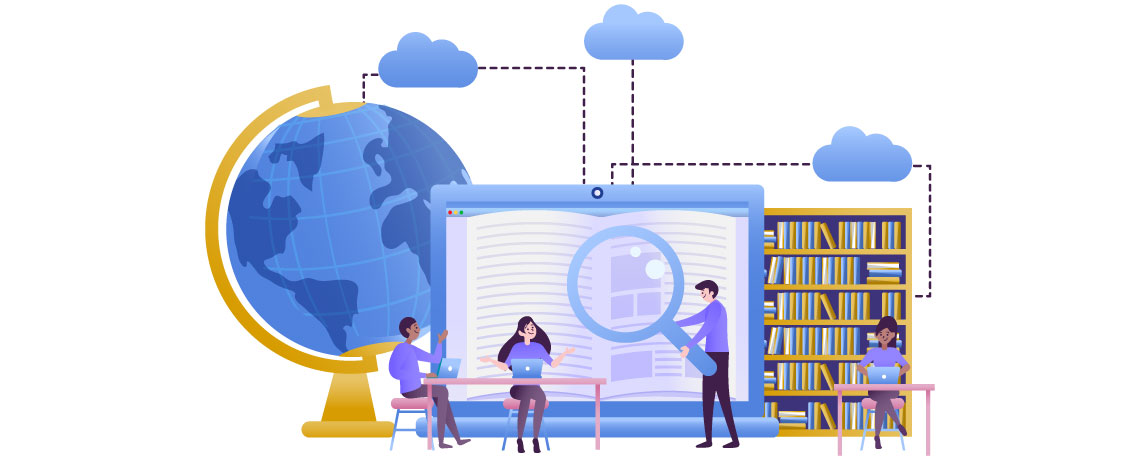How a BBA Degree Can Empower You to Transform the Future of Business

Every product you buy, app you use, or ad you scroll past starts with a business decision. A price set. A strategy planned. A team aligned.
Whether it’s a global tech giant expanding to new markets or a home-grown brand going viral on social media, someone with business acumen is behind the scenes, analysing trends, managing teams and turning ideas into results.
That’s what today’s world demands: people who don’t just work in business, but shape where it’s going next. And that’s exactly what the BBA course is built for.
A BBA degree gives students the tools to understand how companies operate and how they grow. It bridges theory with practice, helping one build leadership skills, master core business functions and unlock career paths across industries.
For anyone asking how to stay relevant in a world driven by innovation, scale and smart thinking, the BBA programme is the answer. It’s not just about getting a job. It’s about learning how to transform the business and the future that comes with it.
For students finishing Class 12 and thinking long-term, the BBA degree offers more than career potential. It offers early access to real business thinking, decision-making tools and the mindset to transform the future of business.
Why the Future of Business Needs Adaptive Thinkers and Strategic Leaders
The business world isn’t what it used to be. Industries are shifting faster than job roles can catch up.
AI is replacing repetitive work. Green companies are attracting global funding. Startups are becoming unicorns in three years or less.
Parents and students ask one question: What kind of degree helps someone lead in this uncertain world? The answer is the BBA degree. Not just because it teaches business. But because it builds people who can think, adapt and lead when everything changes around them.
A BBA programme prepares students not just to follow trends but to set them. It doesn’t produce job seekers. It develops strategic minds, critical thinkers and future-ready professionals. In a competitive job market, a BBA degree stands out as a smart move: one that combines education with action, theory with relevance.
The Evolving Role of Business Graduates in a Fast-Changing Economy
The Bachelor of Business Administration (BBA) is a professional undergraduate programme designed for those who want to build careers in business, management, or entrepreneurship.
Unlike traditional degrees that often stay theoretical, a BBA course focuses on:
- Core business disciplines: marketing, finance, HR, operations
- Exposure to managerial decision-making
- Hands-on projects and problem-solving
Businesses don’t just want qualifications. They want professionals who solve problems, think ahead and lead teams.
The role of a BBA graduate today is no longer limited to sitting at a desk and analysing numbers. Companies now look for:
- Professionals who understand cross-functional roles
- People who can move from data to decision
- Leaders who are comfortable with technology, strategy and people
According to industry reports, job roles like business analysts, digital marketers, project coordinators and customer experience officers have risen sharply over the last 5 years. It demands a mix of skills: management, communication, tech awareness and decision-making.
That’s where the BBA course fits in perfectly. It prepares students to:
- Lead without needing years of experience
- Adapt to global and local market shifts
- Understand the full business lifecycle
- Work across teams, tools and cultures
The BBA degree to transform the business means just that, equipping students with the ability to evolve, solve and succeed in tomorrow’s economy.
Core Strengths of the BBA Curriculum That Build Future-Proof Skills
A strong curriculum isn’t built on outdated chapters. It’s built on relevance. The BBA programme is structured to build practical, job-ready skills in just three years.
Let’s break down the major learning pillars:
| Core Area | Skills Developed |
|---|---|
| Business Communication | Presenting ideas, writing reports, client handling |
| Financial Management | Budgeting, financial planning, cost analysis |
| Marketing Management | Branding, social media, customer strategy |
| Organisational Behaviour | Leadership, team dynamics, workplace behaviour |
| Human Resources | Talent acquisition, payroll basics, employee laws |
| Business Analytics | Data reading, Excel modelling, decision-making |
| Entrepreneurship | Startup building, product development, investor pitching |
Many BBA courses also include real-life projects, group work, internships and software training in tools like Excel, Power BI, or CRM platforms.
- Communication and presentation skills: In team projects, students practise pitching ideas, debating strategies and writing reports.
- Leadership and decision-making: Group assignments and management simulations allow students to lead, take charge and respond to feedback.
- Analytical thinking: Through data-based assignments, one learns to break down problems and make choices using evidence.
- Problem-solving: Real business cases are not black-and-white. Students learn to weigh options and make fast, smart decisions.
- Financial literacy: BBA students don’t just learn balance sheets. They understand how business functions depend on money management.
The idea is simple: Don’t just study business. Do business.
This is how the BBA degree to empower the business builds people who don’t wait to learn on the job; they walk in ready.
Emerging Business Trends for 2025 and How BBA Graduates Fit In
The business world in 2025 will be shaped by trends no school textbook five years ago could predict. But the BBA course is already preparing students for what’s coming.
Here are key shifts and how BBA graduates are trained to meet them:
- Data-Driven Decision-Making
Every business uses data. From Instagram insights to sales dashboards, decision-making now runs on numbers.
BBA students learn how to read, analyse and act on data early through business analytics modules.
- Sustainability and Ethical Practices
Green business is no longer optional. Companies that ignore environmental goals lose customers and investors.
Courses on business ethics, CSR and sustainable strategy are built into many BBA programmes.
- Remote and Hybrid Work Models
Sometimes managers lead teams that they may never meet in person. BBA students are trained in virtual collaboration tools, communication platforms and managing across time zones.
- Startup Ecosystems and Innovation
From tech startups to D2C brands, entrepreneurship is mainstream. The BBA degree includes business plan labs, innovation hubs and pitch events that help students create, not just study, business.
- AI, Automation and Smart Tools
AI won’t take jobs. But it will change them.
BBA students are introduced to how automation affects business and where human decisions still lead.
- Global Collaboration and Cross-Border Business
BBA programmes now offer training in global marketing and international finance. Students are trained in trend-spotting and cultural shifts.
BBA as the Foundation for Leadership, Entrepreneurship and Innovation
Every parent asks one common question: “Will my child only be a job seeker, or can they lead, create and build something new?”
That’s where a BBA degree makes its mark.
A strong BBA programme does more than prepare students for corporate jobs. It shapes them into leaders, founders and innovators. This isn’t a bold promise. It’s backed by how the BBA course is designed. The programme develops business thinking early:
- Decision-making under pressure
- Leading teams on real projects
- Creating strategies for mock startups
- Presenting to actual business leaders
The BBA degree also encourages creative thinking. One learns how to turn a problem into a solution and a solution into a business. It’s not only about knowing the business world. It’s about entering it early and confidently.
How BBA Programmes Integrate Real-World Business Scenarios
One of the most powerful parts of a BBA programme is its focus on practical learning.
This isn’t a course where one reads theories and then forgets them. Instead, students apply what they learn in the real world almost every semester.
What does this look like in practice?
- Internships with companies in marketing, operations, HR, or finance
- Live case studies based on actual business challenges
- Simulations and role plays to sharpen negotiation and strategy skills
- Industry guest lectures from business professionals
- Competitions and hackathons to test business ideas
One key strength of the BBA course is its structure. Students take part in presentations, projects and team activities that mimic the real pressures of business. In some cases, industry leaders sit on review panels for these presentations, offering feedback and advice.
This hands-on learning does more than teach. It builds confidence, problem-solving ability and adaptability: the very traits needed to lead in uncertain times.
Exploring Student Life, Events and Extracurricular Impact on Career Development
Many students and parents think career readiness only comes from the classroom. But in a good BBA programme, the learning goes far beyond lectures.
What happens outside class often shapes how prepared a student is for work. Here’s what to expect:
- Business clubs help students practise real skills like public speaking, debating and managing projects
- Startup cells and entrepreneurship fests expose students to founders and investors
- Leadership roles in clubs give real-time management experience
- Workshops and networking events link students to industry mentors
- Industry visits offer behind-the-scenes views of how companies operate
These experiences help students build confidence, leadership and real connections.
Diverse Specialisations that Empower Students to Choose Their Business Destiny
Not every student wants the same path after school. Some want to manage brands. Others aim to analyse data. A few dream of leading people or building financial models.
A strong BBA programme understands that. It offers specialisations that let students choose their track and go deep. Each specialisation equips one with focused skills. This ensures students don’t just learn broadly, but grow in a direction that matches their interests and career goals.
Here are some high-impact specialisations offered in a BBA course:
| Specialisation | Core Focus Areas | Career Paths |
|---|---|---|
| Applied Economics & Finance | Financial Modelling, Economic Policy, Data-Driven Decision Making | Financial Analyst, Economic Consultant |
| Computational Business Analytics | Python, Business Intelligence, Predictive Modelling | Business Analyst, Data Strategist |
| Digital Technologies | Cloud Systems, Cybersecurity, UI/UX, App Ecosystems | Digital Product Manager, Tech Operations Lead |
| Entrepreneurship & Family Business | Venture Creation, Business Lifecycle, Family Business Strategy | Startup Founder, Family Business Successor |
| Marketing | Branding, Consumer Behaviour, Digital Campaigns | Brand Manager, Marketing Executive |
| Finance | Corporate Finance, Investment Strategy, Risk Management | Banking Consultant, Investment Advisor |
| Human Resources | Talent Acquisition, Employee Engagement, Organisational Behaviour | HR Generalist, Recruitment Specialist |
| Operations | Logistics, Inventory Systems, Project Coordination | Supply Chain Executive, Operations Coordinator |
| International Business | Trade Policies, Cross-Border Strategy, Global Market Dynamics | Export Manager, Global Strategy Analyst |
| Business Analytics | Data Interpretation, Dashboard Tools, Forecasting Techniques | Insight Analyst, BI Associate |
Career Paths After BBA: From Corporate Roles to Entrepreneurial Ventures
People often ask: What comes after this degree? They want clarity, not confusion.
The answer is that a BBA degree opens multiple career doors across industries, functions and company sizes. Here’s a look at what’s possible:
Popular Corporate Job Roles After BBA:
- Marketing Manager
- Digital Marketer
- Financial Analyst
- Financial Advisor
- Human Resources Manager
- Operations Manager
- Operations Associate
- Supply Chain Manager
- Business Analyst
- Sales Executive
- Retail Manager
- Business Development Manager
- Business Development Executive
- Advertising Manager
- Entrepreneur
Industry Sectors That Hire BBA Graduates:
- FMCG
- Retail
- Real Estate
- Media and Advertising
- Banking and Financial Services
- Consulting
- Marketing
- Human Resources
- Technology and IT Services
- E-commerce
- Healthcare and Pharmaceuticals
- Supply Chain Management
A BBA programme doesn’t lock one into a single track.
Some students go on to launch their own ventures, using the foundation they gained through projects, business labs and mentorships during their course. Others pursue postgraduate education, most commonly an MBA, to deepen their expertise. Even international education becomes more accessible with a strong BBA base.
The course prepares students with both depth and flexibility.
The Global Scope of BBA: Preparing for Business Without Borders
Today’s businesses don’t operate inside narrow markets. Every company, whether big or small, is part of a global chain.
That’s why the BBA degree must prepare students to think globally. Top BBA courses include modules like:
- International Business
- Global Marketing
- Cross-Cultural Communication
- International Trade and Economics
These are not just theoretical topics. Students use real case studies of companies expanding into new regions. They analyse global strategies, compare business cultures and study how local decisions affect global impact.
The aim is to build professionals who are comfortable working across:
- Time zones
- Languages
- Regulatory systems
- Cultural styles
This mindset prepares them for roles in multinational companies, export-import firms, or global consulting agencies. More importantly, it helps them start businesses that can go global from Day One. In a market that values agility, this global scope gives students a clear edge.
How a BBA Degree Acts as a Gateway to Postgraduate Excellence?
Many students know that an MBA is in their long-term plan. A good BBA course helps them get there better, faster and more prepared.
Why?
Because the BBA degree covers the same foundational areas that MBA students explore, only earlier. This includes:
- Accounting and Finance
- Marketing and Branding
- Operations and Strategy
- Business Communication
- Organisational Behaviour
- Research and Quantitative Tools
Students who have done their BBA don’t start from scratch in an MBA class. They already understand the frameworks. They’ve already applied them in their BBA.
This gives them a strong edge in competitive exams, group discussions and interviews for top-tier B-schools. Plus, many postgraduate programmes give preference to applicants with BBA backgrounds.
Choosing the Right BBA Programme: Factors to Evaluate Before You Apply
Not every BBA course is built the same.
Some offer strong academic learning but lack industry exposure. Others might focus only on placements but skip out on skill-building.
So, how should one evaluate the right BBA programme?
Key criteria to assess a BBA degree:
- Accreditation and university affiliation
- Faculty’s industry experience
- Curriculum relevance
- Internship opportunities
- Placement history
- Specialisations available
- Student reviews
- Fee structure and transparency
Also, look for institutions that host:
- Business conclaves
- Startup showcases
- Industry panels and mentorship programmes
- Certification tie-ups with platforms like Google
Choosing the right BBA programme means finding a mix of clarity, credibility and career outcomes. This helps build not just a degree, but a direction.
Ready to Lead, Not Follow? Mahindra University’s BBA Programme is Built for You
At Mahindra University , the BBA programme is designed not just to educate but to empower future business leaders. This programme stands apart by offering more than a traditional business degree; it blends future-ready learning and global expectations with real-world relevance, backed by strong industry orientation and academic excellence.
Designed for learners who want to build careers in dynamic, data-driven and digital economies, this BBA course provides deep exposure to both core business principles and emerging technologies. It’s not just about management theory; it’s about preparing students to lead in sectors where innovation, agility and analysis define success.
Here’s why Mahindra University stands out as a strong choice for aspirants looking to transform the future of business through a world-class BBA course:
- 4 trending specialisations to choose from: BBA Applied Economics & Finance , BBA Computational Business Analytics , BBA Digital Technologies and BBA Entrepreneurship & Family Business
- International faculty roster with rich industry-academia background, global exposure and research focus
- Academic partnership with Cornell’s SC Johnson School of Business.
- 3-week international immersion at Cornell University, Ithaca, NY
- Research productive faculty with PhDs from reputed international as well as Indian universities and business schools.
- Industry connections, through the Mahindra Group
Whether one wants to enter the corporate sector, build a business, or go global, Mahindra University’s BBA course provides the right launchpad to shape the future of business.
Conclusion
A BBA degree builds more than just business knowledge. It develops adaptable thinkers, confident leaders and future-ready professionals who can thrive in change. From mastering core disciplines to understanding market trends, students gain the tools to lead with clarity and act with purpose.
Whether one wants to join the corporate world, launch a venture, or pursue a global career, the BBA programme creates a strong, flexible foundation. It empowers students to shape industries, influence decisions and drive innovation with every step. For those seeking a career that starts early and grows fast, the BBA degree is the smartest first move.
If you’re aiming for a BBA degree that combines academic depth, innovation readiness and career-focused learning, Mahindra University offers the right environment to build the skills, mindset and confidence to transform the business world. Apply now.
FAQs
- What is the eligibility for applying to a BBA course in India?
One must complete Class 12 with at least 45–50% marks. Some institutions may require entrance tests or interviews. - Is the BBA degree good for those not from a commerce background?
Yes. The BBA programme is designed to introduce students from all streams to the world of business and management. - Can a student pursue an MBA after a BBA?
Absolutely. In fact, a BBA degree offers a strong base that makes MBA concepts easier to understand and apply. - Is the BBA Degree only for students who want a job?
Not at all. Many students use their BBA degree to start ventures, pursue global careers, or build foundations for family businesses.


























































































































































































































![Arm_Yourself_with_Deep_Business_Knowledge_&_Insights_with_PhD_Program_in_Business_Administration_at_Mahindra_University[1] Arm_Yourself_with_Deep_Business_Knowledge_&_Insights_with_PhD_Program_in_Business_Administration_at_Mahindra_University[1]](https://i0.wp.com/www.mahindrauniversity.edu.in/wp-content/uploads/2023/04/Arm_Yourself_with_Deep_Business_Knowledge__Insights_with_PhD_Program_in_Business_Administration_at_Mahindra_University1.jpg?resize=1140%2C460&ssl=1)
![Emerge_as_a_Forward_thinking_Mechanical_Engineer_with_B_1140x460[1] Emerge_as_a_Forward_thinking_Mechanical_Engineer_with_B_1140x460[1]](https://i0.wp.com/www.mahindrauniversity.edu.in/wp-content/uploads/2023/04/Emerge_as_a_Forward_thinking_Mechanical_Engineer_with_B_1140x4601.jpg?resize=1140%2C460&ssl=1)
![B.Tech_in_Computer_Science_Engineering_(BTech_CSE)_Your_Gateway_to_Become_a_Computer_Genius_1140x460[1] B.Tech_in_Computer_Science_Engineering_(BTech_CSE)_Your_Gateway_to_Become_a_Computer_Genius_1140x460[1]](https://i0.wp.com/www.mahindrauniversity.edu.in/wp-content/uploads/2023/04/B.Tech_in_Computer_Science_Engineering_BTech_CSE_Your_Gateway_to_Become_a_Computer_Genius_1140x4601.jpg?resize=1140%2C460&ssl=1)
![Digital_Marketing_is_Booming_Globally_1140x460[1] Digital_Marketing_is_Booming_Globally_1140x460[1]](https://i0.wp.com/www.mahindrauniversity.edu.in/wp-content/uploads/2023/04/Digital_Marketing_is_Booming_Globally_1140x4601.jpg?resize=1140%2C460&ssl=1)
![MU_Electrical20Computer20Engineering_1140x460[1] MU_Electrical20Computer20Engineering_1140x460[1]](https://i0.wp.com/www.mahindrauniversity.edu.in/wp-content/uploads/2023/04/MU_Electrical20Computer20Engineering_1140x4601.jpg?resize=1140%2C460&ssl=1)
![BA_LLB_Hons_Course_at_Mahindra_University[1] BA_LLB_Hons_Course_at_Mahindra_University[1]](https://i0.wp.com/www.mahindrauniversity.edu.in/wp-content/uploads/2023/04/BA_LLB_Hons_Course_at_Mahindra_University1.webp?resize=1140%2C460&ssl=1)
![Management_&_Business_Administration_is_Tremendously_High[1] Management_&_Business_Administration_is_Tremendously_High[1]](https://i0.wp.com/www.mahindrauniversity.edu.in/wp-content/uploads/2023/04/Management__Business_Administration_is_Tremendously_High1.jpg?resize=1140%2C460&ssl=1)

![whyistraining&placementcellimportant[1] whyistraining&placementcellimportant[1]](https://i0.wp.com/www.mahindrauniversity.edu.in/wp-content/uploads/2023/04/why20is20training2020placement20cell20important1.png?resize=1140%2C460&ssl=1)
![TheDifferencesbetweenRights&Duties[1] TheDifferencesbetweenRights&Duties[1]](https://i0.wp.com/www.mahindrauniversity.edu.in/wp-content/uploads/2023/04/The20Differences20between20Rights2020Duties1.png?resize=1140%2C460&ssl=1)
![sleep_deprivation[1] sleep_deprivation[1]](https://i0.wp.com/www.mahindrauniversity.edu.in/wp-content/uploads/2023/04/sleep_deprivation1.jpg?resize=1140%2C460&ssl=1)
![SelfLoveBlogImage2[1] SelfLoveBlogImage2[1]](https://i0.wp.com/www.mahindrauniversity.edu.in/wp-content/uploads/2023/04/Self20Love20Blog20Image2021.png?resize=1140%2C460&ssl=1)


























































































































